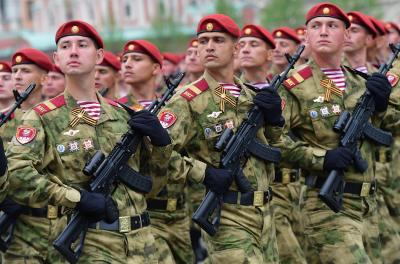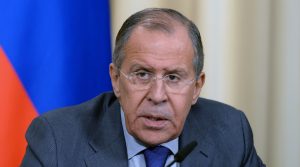Scenario Forecasting: What Could a Russian Intervention in Nagorno-Karabakh Look Like?

Russian Foreign Minister Lavrov’s suggestion to deploy Russian peacekeepers and military observers into the universally recognized Azerbaijani territory of Nagorno-Karabakh and its seven surrounding districts under Armenian occupation pending both sides’ agreement raises the prospect of Moscow’s military intervention in this conflict, which is worthwhile examining since this scenario isn’t as far-fetched as some might think.
***
Dramatic Developments
Wednesday saw two dramatic developments in the Nagorno-Karabakh Continuation War which suggest that it’s either spiraling further out of control or might almost counterintuitively be on the brink of being brought back under control depending on which direction events proceed in the coming days. Russian Foreign Minister Lavrov suggested that his country could deploy peacekeepers and military observers into the universally recognized Azerbaijani territory of Nagorno-Karabakh and its seven surrounding districts under Armenian occupation pending both sides’ agreement in order to monitor the ceasefire. This was proposed after reports that Azerbaijan struck several missile launchers inside Armenia earlier that day which were allegedly preparing to hit targets in its territory and possibly repeat last weekend’s Ganja attack or some similar crime against civilians.
Intervention Pretexts
In theory, any external attack against the territory of Russia’s CSTO Armenia ally could trigger Moscow’s conventional military intervention on Yerevan’s side, but the legal dilemma that the Eurasian Great Power would face (apart from already being wary of Armenia’s attempts to draw it into the war) is that Azerbaijan can argue that it was preemptively defending itself from unprovoked acts of aggression and therefore enforcing the ceasefire in its own way. Nevertheless, as the saying goes for better or for worse, “might makes right” so Russia could always act first and then make its legal case after having already changed the facts on the ground. That scenario is unlikely though for the earlier mentioned reason that Russia wants to avoid being dragged into this conflict, let alone potentially squaring off against Azerbaijan’s Turkish NATO ally.
It might be for that reason why the peacekeeper and military observer proposals were openly floated by the Russian Foreign Minister since they represent a “middle ground” of sorts for Moscow. The emerging narrative that Syrian and Libyan militants are entering the conflict zone to fight on Azerbaijan’s side with Turkey’s support — which is vehemently denied by both Baku and Ankara — adds a sense of urgency to this proposal from the perspective of Russian domestic politics. Even so, however, it wouldn’t at this moment be a plausible enough pretext since the potential deployment of those Russian forces there pending all sides’ agreement wouldn’t stop any speculative spread of foreign militants into the North Caucasus. After all, it wouldn’t make sense for such fighters — if they’re actually even there — to travel to Russia via Nagorno-Karabakh and Armenia.
The “Dark Scenario”
The likelihood therefore exists that the emerging militant narrative might be refined, perhaps with forthcoming reports from the Russian side, in order to make it more convincing, though that would presumably entail suggesting that those fighters might enter Russia via its border with Azerbaijan or even outright make an accusation to that effect. It’s unclear whether Russia would be willing to proverbially “cross the Rubicon” in such a way which would reverse the past decade of progress on bilateral relations just to create the pretext for the unilateral military intervention that would probably follow in that instance, which it hasn’t shown any signs of seriously considering contrary to some “wishful thinking” narratives. Still, since the purpose of this piece is to forecast scenarios, it can’t be outright dismissed even though it’s very unlikely.
In the event that any progress is made on that aforementioned front, then it would amount to the rupturing of relations with Azerbaijan and probably also Turkey, the latter consequence of which might be felt most immediately in Syria. This scenario would also suggest that either some lobbying efforts were successful in Russia and/or that Moscow decided to intervene in advance of its own currently unclear reasons but felt uncomfortable doing so under the pretext of supporting Armenia’s American- and Soros-backed leader, hence the focus on foreign militants. That said, the author feels obligated to state that he doesn’t believe that this scenario is plausible at the moment because no credible indications have been observed. Russia’s impressive restraint in resisting the pressure of some interest groups to intervene shows its commitment to neutrality.
Armenian & Azerbaijani Concerns
Having dismissed the “dark scenario” of a unilateral Russian military intervention under the anti-militant pretext which could quickly spark a CSTO-NATO crisis, it’s now time to explore the ways in which an intervention could be managed by most or all of the concerned stakeholders in order to advance the long-overdue political solution to the Nagorno-Karabakh conflict. Armenia is increasingly operating as a “rogue state” through its attacks on Azerbaijani targets outside the conflict zone, to say nothing of those against civilians, but if Russia can rein in its wayward ally, then it might be able to convince it to accept the deployment of peacekeepers and military observers in order to prevent its total loss in the war. Both sides trust Russia, yet there are also some reservations about what its ultimate role would be following any possible intervention.
For example, some Azerbaijanis are concerned that Russia might simply seek to formalize the status quo and thus prevent the implementation of the four UNSC Resolutions (822, 853, 874, 884) that Russia itself voted for demanding the Armenian military’s full, immediate, and unconditional withdrawal from universally recognized Azerbaijani territory. Likewise, some Armenians might fear that Russia would “betray” them (as they might misleadingly frame it) by pressuring them to abide by the same international legal demands that Moscow itself reiterated on four separate occasions in 1993 through the UNSC. Sputnik’s live update feed from Wednesday reported that “Armenian PM Says Azerbaijan Demanded That Yerevan Surrender 7 Regions Around Karabakh in Exchange for Peace”, which Pashinyan rejected, meaning that he openly flaunts his defiance of international law.
The Speculative Scenario
Since Russia never misses the chance to publicly reiterate its commitment to international law, it can be safely assumed that Moscow disagrees with Yerevan’s illegal stance. Still, Russia might leverage its world-class diplomatic skill to convince Armenia that it won’t seek to implement the relevant UNSC Resolutions if all sides agree to its military intervention, at least not right away that is, though that might then make Baku balk at supporting this for the above-mentioned reason related to its suspicion that this scenario would just formalize the pro-separatist status quo. That might be avoided if Russia secretly coordinates its diplomatic outreaches to Armenia with Azerbaijan, which could lead to Baku not objecting to this scenario as long as it was assured that Moscow would indeed seek to implement those UNSC Resolutions (even if not right away).
Taking Turkish Interests Into Account
The so-called “elephant in the room” is Turkey, which Azerbaijan previously said must be involvedin the peace process in one way or another. Armenia is obviously against that so it wouldn’t agree to anything that could result in its hated foe’s military intervention in the conflict. This rules out any bilateral agreement between Armenia and Azerbaijan to allow a joint Russian-Turkish peacekeeping and military observer force to operate in the occupied territories, except of course if Russia pressures Armenia to accept it or the Turkish force follows the Russian one per a secret agreement between Moscow, Ankara, and Baku sometime after the Russian forces are deployed. This is of course speculative and there aren’t any indications suggesting that it’s being considered at the moment, but it might be the “surprise twist” needed to peacefully end the conflict once and for all.
To explain, replicating the Russian-Turkish Syrian scenario of joint patrols and diplomatic coordination might result in a much-needed breakthrough for resolving the Nagorno-Karabakh conflict. This hasn’t happened in Syria for a variety of reasons related to that conflict’s uniqueness, but in the unexpected event that Armenia and Azerbaijan agreed to a joint Russian-Turkish mission or a comparatively more likely Russian peacekeeping and military observer deployment that was eventually followed by a Turkish one after the separatists were under Russia’s control (per a secret agreement between Moscow, Ankara, and Baku), then the facts on the ground could theoretically be changed in favor of advancing a political solution in according with the Madrid Principles. Russia might operate in Nagorno-Karabakh, Turkey in five of the seven surrounding occupied districts, and joint patrols in the two remaining ones linking Nagorno-Karabakh to Armenia.
Can Russian Diplomacy Save The Day?
The reader must remember that Armenia is extremely unlikely to ever agree to this and that the speculated scenario could probably occur only if it and Azerbaijan reach an initial agreement solely allowing for the deployment of Russian forces, but if Moscow has the political will to cut a secret pragmatic deal with Baku and Ankara to the end that the author wrote about, then it could truly be a game-changer for reining in the “rogue state” of Armenia and finally implementing the four UNSC Resolutions. It would first and foremost require trust between Russia and Azerbaijan since Baku would need to have absolute faith that Moscow would keep its word in any secret trilateral arrangement with Ankara, and then Russia would need to convince Armenia that its proposed deployment wouldn’t ever involve any Turkish component. This would be a herculean task for Russian diplomats.
If they can pull it off, though, then it might eventually end the war by non-military means. Specifically, it provides a formula for implementing the Madrid Principles related to the “return of the seven surrounding districts to Azerbaijani control” (five of which would have a Russian-facilitated Turkish peacekeeper and military observer presence); “an interim status for Nagorno-Karabakh providing guarantees for security and self-governance” (which would be the responsibility of Russian forces); and “a corridor linking Armenia to Nagorno-Karabakh (under the joint control of Russian-Turkish forces). In theory, Russian and Turkish forces would “keep each other in check” to prevent either from too openly siding with the warring party that they’re most closely associated with, and joint control of the corridor would ensure that neither side exploits it for their own purposes.
Concluding Thoughts
What the author aimed to do in this analysis was forecast the most likely scenarios in which a Russian military intervention into the Nagorno-Karabakh conflict might occur. The “dark scenario” of a unilateral one risking a dual war with Azerbaijan and Turkey (perhaps even with NATO too) was discounted since it’s not at all in Russia’s interests, but the pragmatic one of having Russian forces there later open the door for Turkish ones to join them might present the breakthrough that’s needed to finally implement the four UNSC Resolutions on peacefully resolving this long-standing issue. To be absolutely clear, the author is not predicting that any of this will definitely happen nor is he imposing any plan onto anyone, but all that he’s doing is provoking out-of-the-box thinking by all sides in order to hopefully inspire a creative solution that could pave the way for peace.
*
Note to readers: please click the share buttons above or below. Forward this article to your email lists. Crosspost on your blog site, internet forums. etc.
This article was originally published on OneWorld.
Andrew Korybko is an American Moscow-based political analyst specializing in the relationship between the US strategy in Afro-Eurasia, China’s One Belt One Road global vision of New Silk Road connectivity, and Hybrid Warfare. He is a frequent contributor to Global Research.
Featured image is from OneWorld


